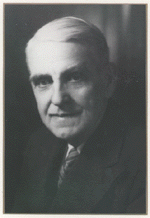Publisher, politician and philanthropist.
Biographer Homer Edward Socolofsky used those words in the title of his 1962 book detailing the life of Sen. Arthur Capper, who left his mark in all three areas.
As a publisher, Capper ran the Topeka Daily Capital and other newspapers that came to have a combined circulation of 4.75 million.
As a politician, he was governor of Kansas for four years and represented the state in the U.S. Senate for 30 years.
As a philanthropist, Capper sponsored a birthday party and picnic held annually for more than 40 years in Topeka. He also founded the organization known as the Easter Seals Capper Foundation.
Capper was born July 14, 1865, in Garnett, the son of Quakers who taught him the importance of honesty, morality, temperance and self-reliance.
He started work at age 14 as a “printer’s devil” at the Garnett Journal, and set out after graduating from high school to make his living as a typesetter at the Topeka Daily Capital.
Capper worked his way up to being a reporter and editor for the Daily Capital, where he covered the Kansas Legislature and U.S. Congress before becoming Congressional correspondent for the New York Tribune.
Capper then returned to Kansas with aspirations of becoming a newspaper owner. He purchased the Topeka Mail in 1893 and the Topeka Breeze in 1895.
Meanwhile, he’d been married in December 1892 to Florence Crawford, whose father — Gen. Samuel Crawford — had been the third governor of Kansas from 1865 to 1868.
Capper bought controlling interest in 1901 in the Topeka Daily Capital, which had gone into foreclosure proceedings.
He went on to purchase several other publications, including Capper’s Weekly and Capper’s Farmer, while building one of the most profitable media enterprises in Kansas. In 1927, Capper purchased WIBW, one of the state’s first radio stations.
Capper’s Weekly continues to be published, as Capper’s, by Ogden Publications of Topeka. The Topeka Daily Capital and WIBW Radio were sold after Capper’s death to Stauffer Communications, which merged the Capital with the Topeka State Journal to form the Topeka Capital-Journal. WIBW Radio and The Capital-Journal are owned today by Morris Communications, which is based in Augusta, Ga.
In addition to being a publisher, Capper became a force in the political arena by finding out what people wanted him to do, then doing it.
A Republican, he ran for governor of Kansas in 1912 but was narrowly defeated by Democrat George Hodges.
Capper tried again in 1914 and beat Hodges, subsequently serving as governor from 1915 to 1919. During his tenure, the Kansas Legislature passed major social and reform legislation as well as tighter laws restricting alcohol and tobacco consumption.
As the state Constitution prevented him from winning a third consecutive term as governor, Capper ran successfully in 1918 for the U.S. Senate, where he served from 1919 to 1949.
Capper became perhaps most well-known in that body for co-sponsoring the Capper-Volstead Act.
That legislation, approved in 1922, gave “associations” of people producing agricultural products certain exemptions from antitrust laws while authorizing the Secretary of Agriculture to prevent them from achieving and maintaining monopolies.
In Topeka, Capper might be best remembered for his annual birthday parties and a Christmas activity that evolved into the Easter Seals Capper Foundation.
Capper began in 1908 to sponsor an annual birthday party and picnic held each July in Topeka featuring free ice cream and a carnival atmosphere. Crowds of 15,000 to 20,000 came for the event, which was discontinued because of severe flooding in 1951.
Capper died at age 86 the following December and is buried in Topeka Cemetery.
But his legacy lives on, in part through an organization that arose from Capper’s yuletide practice of taking his car into low-income neighborhoods loaded with candy and toys to give away.
Conrad Van Natta, Capper’s composing room foreman and the father of a child who’d had polio, talked with Capper —- after taking part in that activity in 1920 — about the plight of children on crutches and in wheelchairs who couldn’t come to the car to get gifts.
Capper responded by establishing a fund to help children with disabilities.
That grew into what today is the Easter Seals Capper Foundation, a Topeka-based organization that works to enhance the independence of people with disabilities, primarily children and their families.

